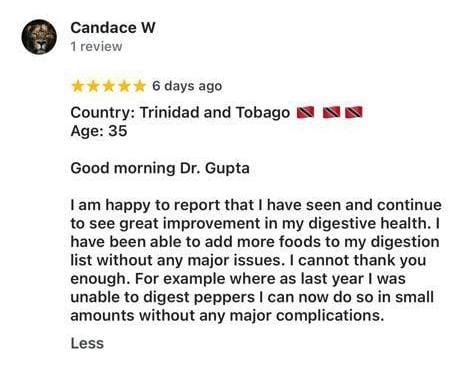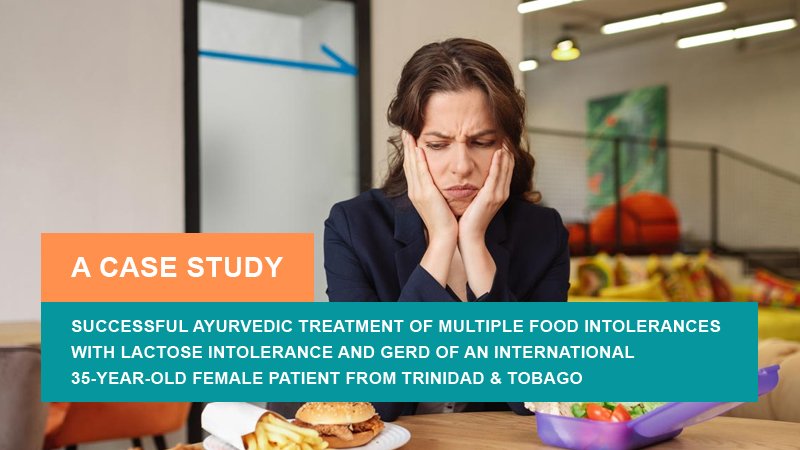The world is recognizing the importance of health as a whole and moving towards a holistic approach. The common medical treatment of gastrointestinal disorders particularly GERD, and food allergies include antacids, histamine-receptor antagonists (H2Ras), or proton-pump inhibitors. However, if medical treatment fails, then patients may have to go for surgical intervention such as anti-reflux surgery with varied prognoses as long-term management. Ayurveda offers effective remedies in such cases where the clinical symptoms are suggestive of food allergies and conventional allopathic treatment is not offering any sustainable benefit.
Abstract
Allergic conditions particularly food allergies are one of the most commonly encountered conditions by both primary care physicians and gastroenterologists worldwide. The conditions like food allergies, GERD, esophagitis treatment require long-term management in the form of lifestyle modification and medical therapy. The line of treatment of these food intolerance treatment and gastrointestinal issues in Ayurveda consists mainly of Shodhana Karma (purification). The present case study deals with an effective Ayurvedic intervention for food allergies, gastrointestinal imbalance, and GERD in a 35-year-old female international patient from Trinidad & Tobago who was successfully treated at IAFA®, India under the supervision of Dr. Gupta.
Keywords: Ayurveda for Allergies, Amalpitta, food intolerance treatment, lactose intolerance successful treatment, esophagitis ayurvedic treatment.
Introduction
The disorders of the gastrointestinal tract including gastroesophageal reflux, hyperacidity, intolerance to certain food including lactose, etc. are affecting many people worldwide. These adversely affect the quality of life of the patients, making it difficult to make dietary choices, causing sleep loss and even hampering social life and contributing to a higher medical cost. IAFA® is one of the leading Ayurvedic institutes in India that is dedicated to ensuring the best and smoothest possible process of treatment for the national and international patients who consult us. The present blog deals with the successful Ayurvedic treatment of a 35-year-old female patient residing in Trinidad and Tobago suffering with multiple food allergies, gastrointestinal imbalance, GERD, and Anaemia. She approached IAFA® on February 18, 2022 via online consultation and her treatment was started under the supervision of Dr. Gupta. She was treated by the doctors initially at Trinidad & Tobago but transient relief occurred with subsequent relapse of the symptoms. During the course of this illness, she was investigated to rule out certain conditions in a bid to diagnose her case. The endoscopy revealed swelling in the lining of the abdomen along with hernia and GERD. After that, she consulted IAFA® for an Ayurvedic opinion in her case. Therapeutic evaluation of treatment was done on improvement in signs and symptoms.
Concept of Allergy according to Ayurveda
In Ayurveda, the root cause of allergies is Agnimandya (weak digestive fire). The hyperacidity is known as Amalpitta in Ayurveda. Pitta is of two types: Adhoga and Urdhwaga Amalpitta. If the pitta takes an upward direction, it causes symptoms such as – vomiting, burning sensation, loss of appetite, and headache, then it is known as Urdhwaga Amalpitta whereas Adhoga Amalpitta includes different symptoms such as anorexia, heaviness in the abdomen, constipation, headache, nausea, acid eructation. Tikshna Agni causes excess secretion of gastric juices, which irritates the gastric mucosa. The Pitta dosha, mainly Pachak Pitta along with Samana Vayu or Kledaka Kapha dosha slackens the Jatharagni (digestive fire) responsible for digestion, i.e Jatharagni Mandya (diminution of digestion). During this stage, the consumed food becomes Vidagdha (undigested). Later on, it turns into Shukta (acidified) and it remains in the stomach for a longer period of time and Vidagdhajirna (indigestion caused due to acidified chyle) manifests which are the premonitory symptoms of Amlapitta. Further, vitiated Pitta dosha gets mixed up with Amavisha Sammurchhana (combination of unmetabolized Rasa and undigested food with Rasa) causing Amalpitta, Grahani, etc.
Case History
- Name: Kieva Watson
- Age/Gender: 35/F
- Address: Trinidad and Tobago
- UID: 6928
- Date of Consultation: 18/02/2022
Chief Complaints
As per the patient’s history, she was having:
- Multiple food protein in-tolerances: Milk and Dairy products, capsicum, chicken and poultry, Pepper and spicy foodstuff.
- Hypersensitivity reactions or allergic responses to many foodstuffs.
- Gastrointestinal imbalance
- GERD
- Anemia
Health History of the Patient
On February 18, 2020, she had a myomectomy due to 10 fibroids and 2 cysts. After surgery, the patient started to suffer from gastrointestinal issues and was slightly lactose intolerant. She was prescribed probiotics. The patient did not complete the course of probiotics and she further became lactose intolerant.
On June 18, 2021, she began feeling extremely lethargic and by 4 am, she was rushed to Emergency. The doctor told her that she had gotten sick due to the food she consumed on that day. After that incident, her gastro issues started becoming worst.
In December, she visited a gastroenterologist and had an endoscopy done. It was found that her stomach lining was inflamed, small hernia and small ulcer were also detected in the findings.
Diagnosis
Based on the patient’s history, and assessment of clinical features, the final clinical diagnosis made was Amalpitta and Grahani (lactose intolerance) by Dr. Gupta with special reference to Gastroesophageal Reflux Disease (GERD).
Treatment Plan
Internal Medication
- IAFA Swaras Chikitsa (Aahar Amrutham Ras)
- IAFA Pitpapra Capsules
- Triphala Capsules
Dosage
- Aahar Amrutham Ras: 30 ml with water to be taken twice a day with an equal amount of water after meals.
- IAFA Pitpapra Capsules: 2 capsules to be taken twice a day in the morning on an empty stomach and in the evening 30 minutes before meals with water.
- Triphala Capsules: 2 capsules to be taken once a day at bedtime with water.
Diet and Regimen
Ahara (Diet) and Vihara (Lifestyle) have a very important role in the causation and management of disorders. Hence, detailed instructions were explained to the patient.
Pathya (Wholesome Diet and Lifestyle):-
- The patient was asked to take light and freshly prepared food, coconut water, pomegranate, vegetables like white pumpkin, bitter gourd, green leafy vegetables, wheat, old rice, green gram, sugar candy, and fruits like gooseberry, sweet lime.
- Yoga, Pranayama, and Meditation on a regular basis were also recommended.
Apathya (Unwholesome Diet and Lifestyle):-
- Avoid excess spicy, sour, salty substances, fried and junk food, tea, coffee, and alcohol.
- Avoid untimely and irregular food habits, food containing excess oil, chilies, etc.
- Avoid lying down immediately after position and in the supine position.
Follow–up and Outcome
The patient was reviewed after one month of treatment. The above treatment plan along with the diet and regimen by IAFA® provided highly significant relief to the patient. After one month of treatment, symptoms such as lactose intolerance, nausea, and gastrointestinal discomfort after eating a particular type of food were markedly improved. The patient was relieved after one month of the treatment. Hence, this Ayurvedic treatment protocol by IAFA® proved an effective alternative treatment for the patient residing in Trinidad & Tobago.
The patient is quite satisfied with the treatment provided by Dr. Gupta at IAFA®. Below is a Happy Note from our Patient:

“I am happy to report that I have seen and continue to see great improvement in my digestive health. I have been able to add more foods to my digestion list without any major issues. I cannot thank you enough. For example, whereas last year I was unable to digest peppers, I can now do so in small amounts without any major complications.”
Conclusion
The excess formation of vitiated Pitta is the main pathological mechanism behind the manifestation of Amlapitta. The medication that was chosen for the treatment of the same by IAFA® in the present case study has Madhur-Tikta Rasa (sweet-bitter taste), Sheet Virya (cool potency), Madhur Vipaka (post-digestive effect is sweet taste), Laghu (light) and Ruksha-Guna (dry) in nature. The diagnosis of the disease and treatment (Dosha-Dushya Vighatan) on the basis of Doshik performance by Dr. Gupta at IAFA® proved to be beneficial in the present case.
Institute of Applied Food Allergy (IAFA®) is the center of treating various types of allergies successfully where Ayurvedic treatment of various etiologies such as esophagitis treatment, lactose intolerance treatment, food intolerance successful treatment, etc. are done on par with the highest standards and according to the principles dating back to Vedic times. IAFA® aims at bringing natural treatment without adverse effects promoting holistic health. For any query, you can call or WhatsApp us at (+91) 961-218-0000.







